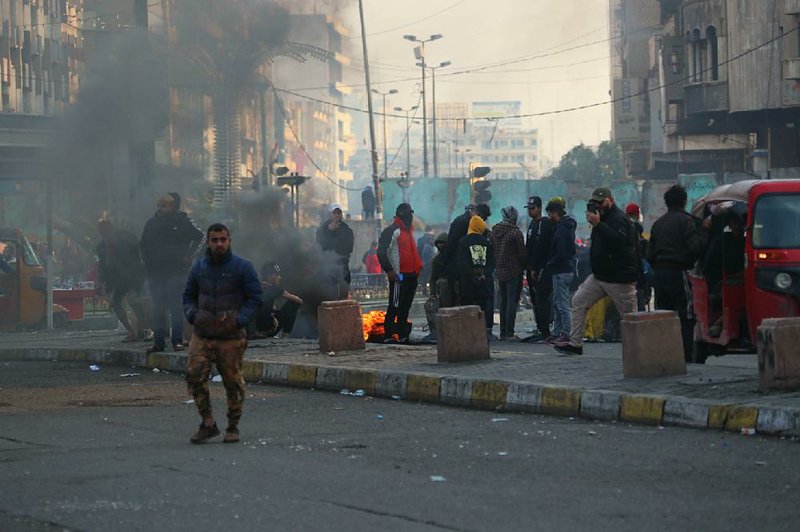BAGHDAD -- Security forces set fire to anti-government protest tents in the country's south early Saturday and reopened key public squares in Baghdad that had been occupied by demonstrators for months.
The crackdown came hours after a powerful Shiite cleric dealt the protest movement a blow by withdrawing his support, prompting his followers to pack up and leave the demonstration encampments.
One protester was killed and 44 were wounded when security forces fired tear gas and live rounds to disperse them from Baghdad's Khilani Square as clearance operations were underway, medical and security officials said. The officials spoke on condition of anonymity in line with regulations.
Near the square, demonstrators gathered around a torched tuk tuk, a type of auto-rickshaw taxi that became a symbol of the anti-government demonstrations, which security forces had set ablaze.
[Gallery not loading above? Click here for more photos » arkansasonline.com/126iraq]
Activists said the presence of Muqtada al-Sadr's followers and his militia group had shielded the protesters from security forces and unknown groups looking to harm and suppress them. With that cover gone, many in the 4-month-old movement feared the worst.
His decision to withdraw support came just hours after tens of thousands of his followers staged a separate anti-U.S. rally in a nearby Baghdad neighborhood, which most anti-government demonstrators steered clear of. The succession of events amid a political tug of war over naming the next prime minister sent a clear message to Iraqi officials: The Iraqi street was al-Sadr's domain.
It also came as Iraq is embroiled in ongoing U.S.-Iran tensions that reached a fever pitch when an American drone strike killed Qassem Soleimani, a top Iranian general, outside Baghdad's airport.
"He is reclaiming the mantle of populist leader with a popular base able to mobilize large crowds," said Fanar Haddad, senior research fellow at the Middle East Institute, National University of Singapore.
In Tahrir Square, the hub of the anti-government protest movement in Baghdad, protesters said they were fearful of what would come next.
"We are all alone now," said Mustafa, 24, who asked that his full name not be used, citing fear of reprisals.
The demonstrators have been critical of government corruption, high unemployment and Iranian influence in Iraqi politics. Crackdowns by security forces have killed at least 500 protesters.
In a tweet Friday evening, al-Sadr indicated his "disappointment" toward anti-government protesters in Tahrir Square.
"I am expressing my disappointment and my regret toward all those who doubted me among the Tahrir Square protesters," said the tweet. "I thought they were supporters of me and of Iraq." He also accused protesters of being "foreign paid tools."
A spokesperson for al-Sadr said his supporters withdrew because protesters had insulted those participating in the anti-U.S. rally and even obstructed access to the rally point.
At about 2 a.m. local time Saturday, riot police set fire to a protest encampment in a central square in the oil-rich southern city of Basra, two activists said. The crackdown came after al-Sadr's followers had packed up their tents and left.
"The protest square is now controlled [by the security forces], after they used force," said Basra activist Nakeeb Lueibi. "This is considered a betrayal by the al-Sadr bloc. ... There will be no peace after what has happened in Basra last night."
Information for this article was contributed by Murtada Faraj of The Associated Press.
A Section on 01/26/2020

